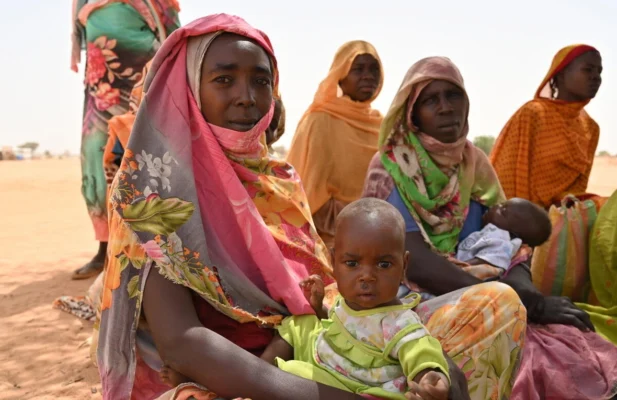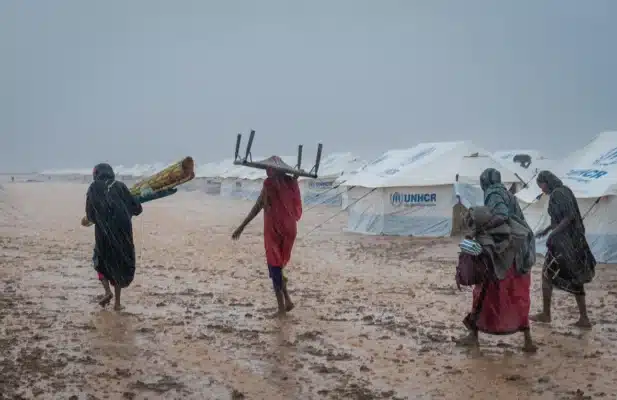
Refugees use plastic sheets to shelter from the rain at a spontaneous site for new arrivals from Sudan in Adre, eastern Chad. © UNHCR/Faouzia Haidara
This is a summary of what was said by UNHCR spokesperson William Spindler – to whom quoted text may be attributed – at today’s press briefing at the Palais des Nations in Geneva
GENEVA – With the onset of the rainy season, severe flooding across Cameroon, Chad, Mali, Niger and Nigeria has significantly worsened the situation of refugees and internally displaced people (IDPs) in the region. UNHCR, the UN Refugee Agency, emphasizes the importance of including forcibly displaced people in national response plans.
The floods have devastated communities, destroyed homes and infrastructure and heightened protection risks for the most vulnerable, severely affecting forcibly displaced populations who were already living in precarious conditions. Many are now sheltering in overcrowded and makeshift locations with limited access to essential services. Considering the effects of climate change, worsening food insecurity, and the increased risk of waterborne diseases it is vital to ensure that the needs of refugees and internally displaced people are not overlooked.
In Nigeria, severe floods have swept through 29 of 36 states, affecting over 600,000 people. At least 200 people have died and over 225,000 have been displaced, including many who had already been uprooted by conflict and climate change. The destruction of over 115,000 hectares of farmland could worsen the food insecurity situation at a time when 32 million people in the country are already facing acute hunger.
UNHCR and its partners are distributing 10,000 tarpaulin sheets to the most severely impacted displaced people in some of the hardest-hit states. Unfortunately, funding shortages are making it difficult to assist additional communities in need. The rainy season in Nigeria is expected to continue until September in the north, and November in the south.
All 23 provinces of Chad have been impacted by flooding since July. According to the Chadian authorities and partners, more than 964,000 people (166,000 households) were affected by the floods as of 25 August. Refugee communities in eastern Chad are particularly vulnerable, with more than 40,000 refugees affected. So far, 145 people have died, over 251,000 hectares of land have been submerged, more than 70,000 houses destroyed, and 29,000 heads of livestock have perished.
In Cameroon, between 11 and 21 August, torrential rains destroyed more than 8,600 homes, flooded thousands of hectares of farmland and crops, and caused the loss of thousands of animals. Almost 19,000 households, some 159,000 people, were affected, including almost 50,000 refugees. Local authorities and humanitarian partners are putting in place emergency response plans but face major logistical challenges including access difficulties and the growing risk of epidemics.
In Niger, severe flooding triggered by heavy rains has caused widespread destruction, particularly in the Maradi, Dosso, Tillabery and Zinder regions, which are also home to significant numbers of displaced people. Since the onset of the rains in July, over 217 people have died, and more than 700,000 have been affected. The floods have devastated infrastructure, including roads and farmland and disrupted the education of over 39,000 children. Access to areas where refugees are settled has been compromised, prompting the army to evaluate alternative routes for relief efforts. UNHCR has mobilized resources to support those affected by providing 3,000 essential relief kits, with 317 already distributed in Zinder. Additional aid deliveries have been made in Tahoua, and further distributions are planned for Ouallam and Ayorou.
Displaced families, including refugees and IDPs, are facing a catastrophic situation due to the compounding effects of conflict, climate change, and now devastating floods. They need emergency shelter, food, water and medical care immediately.
For more information on this topic, please contact:
- In Dakar (regional), Alpha Seydi Ba, baalp@unhcr.org, +221 773 457 454
- In Geneva, William Spindler, spindler@unhcr.org, +41 79 549 59 98





